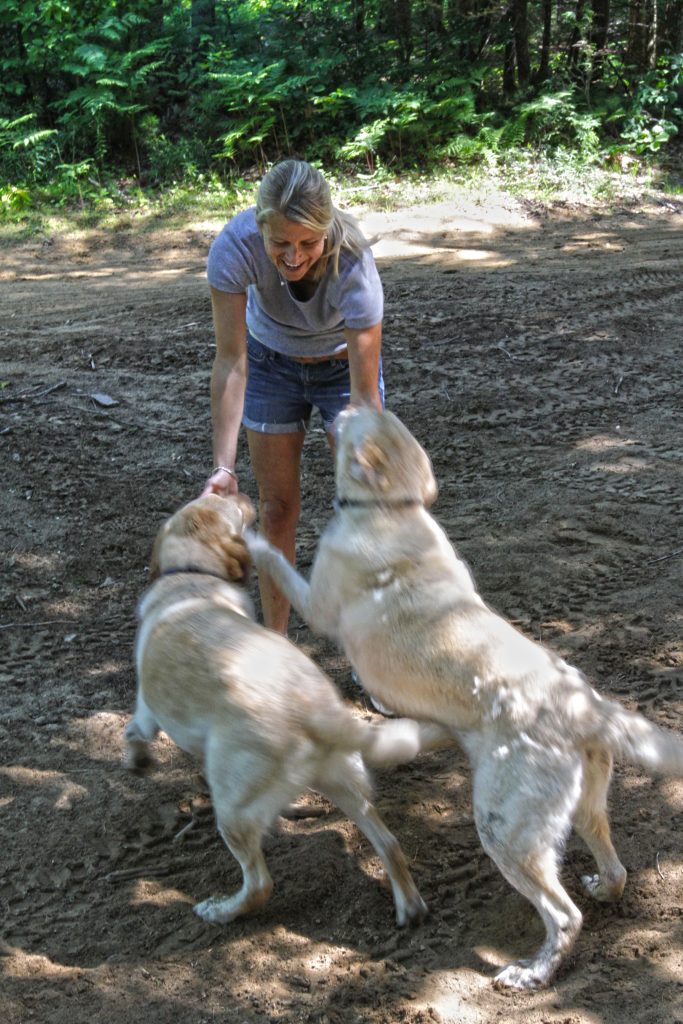“No elementary phenomenon is a phenomenon until it is an observed phenomenon.”
—John Wheeler, physicist

Alison and I have been married for thirty-two years. During that time, we have had four dogs, all yellow Labs. Bowdoin, Tampa, Tucker, and Scout are their names. Only the last of which is still with us today.
Most dogs love people, but yellow Labs really love people. Wherever you are is where they want to be. Whatever you are doing is what they want to do.
Our current lab, Scout, has a favorite treat. We call it a “bully stick”. It’s a long, slender piece of rawhide that he ritualistically upon receipt carries proudly around the house before hunkering down and consuming it, a dramatic process that takes about twenty minutes.
In keeping with the subject of oneness (the awareness that separateness is an illusion), what fascinates me about Scout and his bully stick is that he experiences it differently when he knows he’s being watched versus when he thinks no one is watching.
When he first receives the treat, it’s clear to him that he is being observed. The ceremonial handover comes with praise, so he appreciates the attention as well. In those early moments, when all eyes are upon him, Scout has never stood taller, pranced more crisply, or exuded more confidence and pride. His tail is wagging, and he makes this odd groaning sound of pleasure. It’s not just the bully stick that excites him. It’s the act of us giving him the bully stick and then watching him with it that puts him on such a high.
Invariably, however, we move on to other things before Scout finishes his treat. We engage in other activities—talking, cooking, reading, or even leaving the room. At that moment, when our direct attention evaporates, Scout’s demeanor changes. He still has the bully stick, and he will eat it, but the prideful prancing puppy morphs back into a creature of normal size and enthusiasm. The bully stick itself transforms from a veritable piece of gold bullion to something that’s better than nothing to gnaw on and consume.
The bully stick alone does not set Scout off. It’s us watching him with the bully stick that gives the moment its heightened meaning.
Observing the world around us changes the world around us. This is one of the most fundamental, yet complex, realities for humans to understand. To know this is to learn to see the world anew.
***
Look at me, Daddy!
Watch this, Daddy!
Hey, Daddy, want to watch me dress this doll? Dribble this ball? See how fast I can run?
These are some of my favorite, unforgettable phrases from our daughters’ childhood.
Children love to be watched by their parents, grandparents, family, and friends. The act of being watched gives the ordinary extraordinary meaning.
It was the same for me as an athlete. On the basketball court, when I sank a shot in practice it was just another shot. But if my coach happened to see it and say Nice shot, Kevin, then that same shot suddenly became more meaningful and important.
***
American physicist John Wheeler came to describe our world as a “participatory universe.” Whenever we engage the universe (which is always), the universe is impacted; it changes.
Additionally, how we are feeling when we engage a piece of the universe dictates how that segment of the universe will appear and even respond.
As the writer Gregg Braden says, “Experimental evidence is leading to a conclusion that we’re creating the universe as we go and adding to what already exists! In other words, we appear to be the very energy that’s forming the cosmos, as well as the beings who experience what we’re creating. That’s because we are consciousness, and consciousness appears to be the same ‘stuff’ from which the universe is made.”
Observing is creating. The emotions we bring to what we observe influence what is created. This is the essence of a “participatory universe”.The truth is that the feelings, emotions, and expectations one has while observing impacts—you might even say, creates—what we see. I’ve stood in a certain place and seen my surroundings as amazing and, at a different time, seen the exact same surroundings as dull and ordinary. In each case, I created the mood that defined the scene. In this way, each of us is a piece of the hand of God. The world around us morphs to fit that which we feel. In a world in which everything is related and interconnected the feelings and intentions of the viewer impact that which is being viewed.
Thank you for considering my thoughts. In return I honor yours.
Every voice matters. Nestled between our differences lies our future.
www.thebusinessofsharedleadership.com